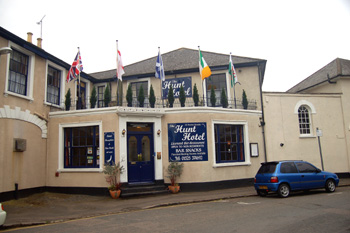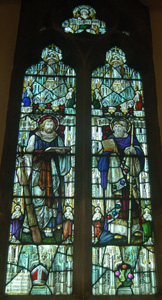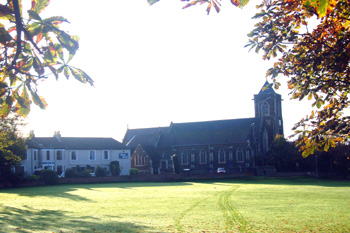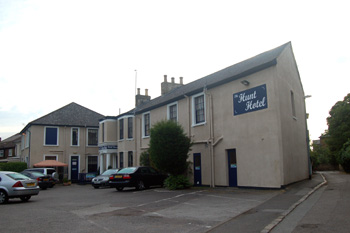The Hunt Hotel Linslade

Hunt Hotel May 2008
Hunt Hotel: 10 Church Road, Linslade [previously Park View]
The Hotel was at first called the Railway Hotel and was sold at auction under this name in 1863 [BML10/44/3]. The particulars described the hotel as: "adjoining Church Street, and occupying a most eligible site, facing the railway Station, having every convenience for carrying on a lucrative trade, with groom's cottage and loose boxes for nine horses &c., enclosing a large yard". The sale was carried out "by order of the mortgagees" and so clearly the original owner could not repay the mortgage.
The particulars go on to describe: "All that recently-erected, very valuable, and much frequented brick-built and slated property known as the Railway Hotel". The building comprised:
- Basement: "capital dry" kitchen; pantry, wine and ale cellars;
- Ground Floor: large smoking room; bar and bar parlour;
- First Floor: billiard room above the bar parlour; six bedrooms and a W.C.;
- Outside: large yard; brick and slate brewhouse; tap room; five "excellent and well-arranged" loose boxes; groom's cottage with saddle room and three bedrooms and a large store over; two loose boxes and two stalls; "bricked Dung Hole, and a Pump with a well of excellent water, and all suitable and necessary conveniences for carrying on an extensive and lucrative trade as an Innkeeper"
The particulars ram the point home: "The Auctioneers beg to call attention to this most eligible and valuable Property, all recently erected in a most substantial manner, and occupying one of the most commanding and best situations in the neighbourhood, and, in the hands of the present tenant, is doing a good Trade". Thomas Ball, the tenant, paid £70 per annum rent. He had been tenant since 1859, suggesting that as the date the place was built and began operating as a hotel.
By 1873 the name of the establishment had changed to the Hunt Hotel. The name Hunt Hotel was probably chosen for the hunting which was popular in the neighbourhood in the 19th century. Sales particulars for larger properties in this period always mention the hunting in the vicinity and suggest the property could be used as a hunting box. James Sheerman, who had previously kept the Elephant and Castle Hotel, kept the Hunt for over thirty years and both he and his wife have stained glass windows dedicated to them in nearby Saint Barnabas' church.

James Sheerman memorial window in north chapel of Saint Barnabas October 2008
The Hunt Hotel was valued in 1910 for John Homes and the draft reads [BML10/44/121]: “This property has been recently modernised and contains the following accommodation:
- In the Basement: Cellarage;
- On the Ground Floor: Bar, Smoke Room, Bar Parlour; Dining Room; Drawing Room; Ante Room; Billiard Room; Card Room; Office; Lavatory; Kitchen; Scullery; Pantry;
- On the First Floor: Two Sitting Rooms; 12 Bedrooms; 2 Secondary Bedrooms; 2 bathrooms W.C.'s; Housemaid’s Closet; Hot Cupboard.
- Gas is laid on also hot water from a separate boiler to the cooking range and the drainage is connected to the main sewer”.
“I have been asked to give the value of this property firstly with the benefit of licence and secondly without same. To do this one or two points must be borne in mind viz the amount of trade done in liquors, the cost of the licence and the inconsequence, if any, caused to visitors if the licence were abandoned. I find the ordinary bar trade to the Hotel is quite negligible quarterly and not worth the extra amount payable under the Finance Act by about £60 per annum neither do I think it worthwhile paying such a sum for the sake of the profit in supplying visitors with intoxicants, the ordinary practice in vogue at boarding houses could be pursued with the saving of duty and I think no great detriment to the trade. I am therefore of opinion that the property is of practically the same value without a licence as with one and I do not contemplate giving two values but estimate the value under either circumstance at £1,500. I would, however, draw attention to whether under Section 45 of the Finance Act if the Bar Trade were stopped a considerable reduction could not be made in the licence and thus the proprietor could still cater for visitors”.

Hunt Hotel and Saint Barnabas seen from the station October 2008
“2. The Stabling &c. This is all brick built and slated and for the most part is in good repair, it consists of:
(a) The yard and premises between Church Road and New Road. The buildings contain two small store houses, range of boxes numbers 1 to 11 under one roof, range of 6 boxes 12 to 17 with saddle room over, range of 5 boxes 18 to 22 with granary over (under repair). These all open onto a small yard. A large range of 16 boxes numbers 23 to 38 with 6 saddle rooms over and 4 other rooms in disrepair. Saddle room and coach house adjoining. Adjoining the last mentioned is one of the dwelling houses in good tenantable repair containing the following accommodation cellars, kitchen, scullery, pantry, w.c., 5 bedrooms and bathroom. On other side of gateway is the Groom’s House, recently put into repair containing kitchen, scullery, sitting room and 4 bedrooms, adjoining are two stores and a motor house also a range of 15 boxes numbers 30 to 53 and lofts over while a further range of 9 boxes numbers 54 to 62 with loft over completes the buildings in the yard.
(b) The yard with cottage and stabling let to Lord Dalmeny [the future 6th Earl of Rosebery, son of a Liberal prime minister and successful horse breeder at the Mentmore and Crafton studs, twice winning the Derby] abutting on 10 Church Road comprising a small groom’s cottage and a range of 12 boxes with lofts and saddle rooms over, a range of 6 boxes including an isolation box (this part is used by Lord Dalmeny on Lease for 21 years from May 1st 1909 at £75 per annum).
(c) The yard and stable on opposite ends of New Road gas 6 good boxes with rooms over them with a number of other boxes more or less dilapidated and not fit for use until put into repair.
I am of opinion that the value of the stabling, dwelling houses and cottage described above is £2,650”. The licensee, John Homes, then appealed, successfully against the level of rates for which the property had been assessed [BML10/44/122].

Rear of Hunt Hotel June 2008
References:
- BML10/44/3: sale particulars: 1863;
- BML10/44/13: auction sale at Hunt Hotel: 1872;
- BML10/44/15: auction sale at Hunt Hotel: 1872;
- BML10/44/19: auction sale at Hunt Hotel: 1879;
- BML10/44/21: auction sale held at Hunt Hotel: 1885;
- BML10/44/24: auction sale at Hunt Hotel: 1888;
- BML10/44/26: auction sale at Hunt Hotel: 1890;
- BML10/44/28: auction sale at Hunt Hotel: 1890;
- BML10/44/29: auction sale at Hunt Hotel: 1891;
- BML10/44/121: request for valuation of Hunt Hotel: 1910;
- BML10/44/122: correspondence regarding above valuation: 1910-1912
- BML10/44/52: auction sale at Hunt Hotel: 1929;
- Z1105/1: Liquor Licence Traders Survey form: 1961
List of Licensees: note that this is not a complete list; entries in italics refer to licensees where either beginning or end, or both, dates are not known:
1859-1863: Thomas Ball;
1869: Mrs.M.Merry;
1871-1903: James Sheerman, hotel keeper [died 1904];
1910-1925: JohnHomes;
1928-1939: Mrs.B.Manley;
1966: Leonard Jack Slade;
1971: Douglas Hall Hebsworth;
1972: Rex Ogden;
1978: Ian Thomas Tring;
1981: David Naylor;
1992: Heather Anne Collins.